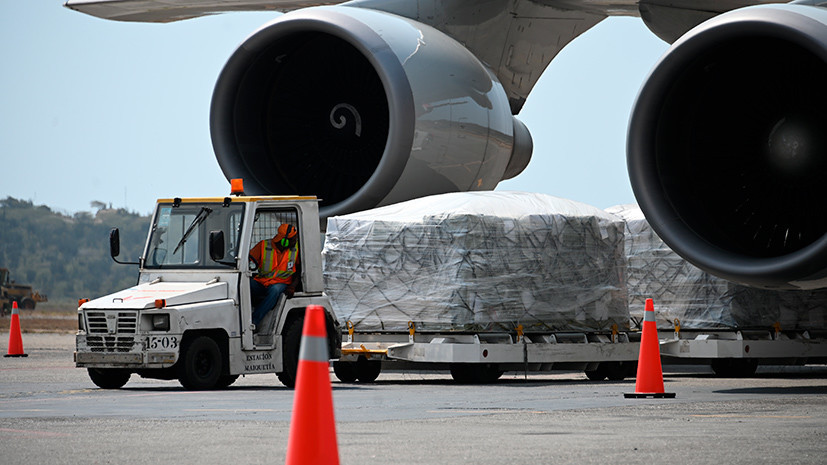In Q2 2019, the international air freight index may drop to its lowest level in the last nine years. According to the May report of the World Trade Organization (WTO), the indicator has been continuously decreasing for more than a year, and from April to June runs the risk of reaching 92.3 points.
The fall of the indicator below the level of 100 points indicates that the industry is lagging behind the medium-term trends. In this case, as follows from the materials of the WTO, the currently expected value of the index may be the lowest since January 2010.
A serious slowdown in the sector of cargo air transportation is also noted in the International Air Transport Association (IATA). According to the organization, in 2018, global demand for the delivery of goods by air increased only by 3.5% against 9.7% in 2017. Against this background, IATA experts almost halved the forecast for market growth in 2019 from 3.7% to 2%.
Moreover, the organization also worsened expectations for the profits of world airlines in 2019 from $ 38 billion to $ 35.5 billion. IATA Director General Alexander de Zhunyak said this on May 17. According to him, in the near future, the association intends to once again reconsider its forecast for profits in the direction of additional decline, reports Reuters.
Note that since the beginning of 2019, the most noticeable drop in demand for the delivery of goods by air has occurred in Europe. From January to April, freight traffic at airports in the region dropped by 1.8% immediately. Such data are provided by the European branch of the Airports Council International (ACI Europe).
One of the main reasons for the slowdown in the air cargo market was the general decline in the growth rate of the global economy and trade as a result of the tariff war between the United States and China. This was told in an interview with RT by an expert from the Academy of Financial and Investment Management Gennady Nikolaev.
“The trade conflict violates regional supply chains, in which not only the States and the PRC take part, but also third-party countries, such as South Korea, Taiwan and others. Thus, there has been a widespread decline in world exports to lows since 2009. In the absence of changes in relations between the United States and China, the situation will only worsen, which is why the growth potential of the global economy is currently seriously limited, ”explained Nikolayev.
Recall, after 11 rounds of trade negotiations since the beginning of the year on May 10, the United States decided to aggravate the conflict with the Asian republic and increased duties on Chinese goods to the amount of $ 200 billion, and also threatened to impose additional tariffs on products from the PRC for $ 300 billion. Beijing responded immediately - China announced on the introduction of retaliatory duties in the amount of $ 60 billion from June 1.
Against the background of the ongoing trade war, the International Monetary Fund (IMF) expects a decline in global GDP growth in 2019 to 3.3% versus 3.6% in 2018. At the same time, according to the forecast of the WTO, the total volume of world trade in the current year will increase by only 2.6%, although the organization had previously expected growth of 3.7%.
According to analysts surveyed by RT, as a result of the slowdown in world trade and global GDP growth, companies in most countries are trying to reduce additional costs and are gradually abandoning cargo transportation by air due to their high cost. According to the general director of Oriole Capital, Andrei Khokhrin, the transportation of goods by airplanes traditionally has a higher cost due to the rental of aircraft and the cost of fuel.
Thus, according to the expert’s estimate, the recent increase in world oil prices is putting additional pressure on the cargo aviation market. It should be noted that since the beginning of 2019, the cost of energy for the Brent benchmark has increased by almost 35% and is currently trading at around $ 72 a barrel.
At the same time, the popularity and availability of sea and rail freight is growing in the world, which, in turn, also makes businesses less likely to use air transport products. This opinion was expressed in a conversation with RT by the head of the investment department “BCS Broker”, Narek Avakyan.
“On average, air transportation is three to four times more expensive than rail and eight times more expensive than sea. Therefore, I think that the segment of the market for the air transport of goods will continue to be under pressure, since the construction of new sea terminals and railways in the world is going quite actively and fewer companies need to transport goods by air transport, ”said Avagyan.
According to the expert, over the next few years, market growth rates can slow to 0.5% per year. At the same time, as Andrei Hohrin believes, in the short term, a decline in the share of the aviation sector in the transport balance of companies in the retail sector will increase the delivery time for goods and, as a result, will lead to an increase in production costs and prices for final goods. At the same time, according to the analyst’s estimate, in the long term, some retailer companies may begin to refuse to sell goods of a limited shelf life.

